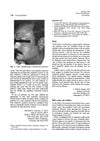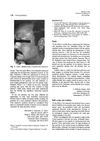 1 citations,
January 1989 in “Journal of The American Academy of Dermatology”
1 citations,
January 1989 in “Journal of The American Academy of Dermatology” The conclusion is that proper communication about the realistic effects of hair loss and skin aging treatments can improve dermatologists' credibility.
 January 1989 in “Journal of The American Academy of Dermatology”
January 1989 in “Journal of The American Academy of Dermatology” Dr. Hanke acknowledges the success of CO₂ laser for less severe blast tattoos and suggests dermabrasion for more extensive injuries, while also discussing dermatology's media presence and issues with minoxidil research.
9 citations,
May 2002 in “PubMed” Retinoic acid affects skin and hair health by working with specific receptors, and its absence can lead to hair loss and skin changes.
8 citations,
November 2009 in “The Neurologist/The neurologist” If someone has scaly skin, muscle stiffness, and intellectual disability, doctors should consider Sjogren-Larsson Syndrome, but other conditions if more symptoms are present.
36 citations,
March 1989 in “British journal of dermatology/British journal of dermatology, Supplement” DPCP is more effective than tretinoin gel for treating severe alopecia.
 September 1988 in “Inpharma (Balgowlah)”
September 1988 in “Inpharma (Balgowlah)” Retinoids are effective for acne but can cause serious side effects.
5 citations,
August 1999 in “Disease-a-month” Hormonal imbalances can cause acne, and treatments may include hormone-blocking medications.
19 citations,
October 1988 in “Clinics in dermatology” Retinoids might help hair grow and improve hair loss treatments.
2 citations,
January 2014 in “Photochemical & photobiological sciences” Grasp protein helps maintain skin health after UVB exposure.
38 citations,
August 1999 in “New England journal of medicine/The New England journal of medicine” Indinavir can cause hair loss and other skin problems.
29 citations,
July 2004 in “The journal of investigative dermatology/Journal of investigative dermatology” The enzymes Aldh1a2 and Aldh1a3 are involved in making retinoic acid in hair follicles and have different roles in hair growth.
 59 citations,
January 2015 in “Nanoscale”
59 citations,
January 2015 in “Nanoscale” The new micelle formulation delivers acne treatment more effectively and safely than current gels.
 April 2018 in “The journal of investigative dermatology/Journal of investigative dermatology”
April 2018 in “The journal of investigative dermatology/Journal of investigative dermatology” Double-stranded RNA helps regenerate hair follicles by increasing retinoic acid production and signaling.
 55 citations,
July 2013 in “Dermatologic therapy”
55 citations,
July 2013 in “Dermatologic therapy” Some dermatological medications can impair male fertility, so consult a doctor before trying to conceive.
July 2021 in “Authorea (Authorea)” Graham-Little Piccardi Lassueur Syndrome is a rare skin condition with specific hair loss and skin symptoms.

Cosmetics can help with mild skin problems and daily care but must be used carefully to avoid skin irritation.
15 citations,
May 2013 in “Ophthalmic Plastic and Reconstructive Surgery” Botulinum toxin injections greatly reduced pain in Parry-Romberg syndrome.
 1 citations,
December 2022 in “Life”
1 citations,
December 2022 in “Life” Topical corticosteroids are the main treatment for Erosive Pustular Dermatosis, but recurrence is common after stopping treatment.
 6 citations,
November 2018 in “Antimicrobial agents and chemotherapy (Print)”
6 citations,
November 2018 in “Antimicrobial agents and chemotherapy (Print)” Fluconazole can cause hair loss, but the exact cause is unknown.
 4 citations,
August 2010 in “Journal of the American Academy of Dermatology”
4 citations,
August 2010 in “Journal of the American Academy of Dermatology” Cicatricial alopecia involves scarring hair loss and can be treated with various medications.
The enzyme Dgat1 is essential for healthy hair and skin by controlling retinoid levels.
14 citations,
March 2019 in “European journal of pharmaceutics and biopharmaceutics” Proretinal nanoparticles improve skin absorption and reduce irritation of topical retinoids.
 76 citations,
January 2007 in “American Journal of Clinical Dermatology”
76 citations,
January 2007 in “American Journal of Clinical Dermatology” Women with PCOS often have skin problems like excessive hair, acne, hair loss, and dark patches, which can be treated with hormonal and non-hormonal therapies.
 April 2017 in “The FASEB Journal”
April 2017 in “The FASEB Journal” Eating more vitamin A changes hair growth-related proteins in mice, affecting hair cycle stages.
42 citations,
August 2016 in “Nanomedicine” The new adapalene formulation using TyroSpheres is more effective and less irritating for acne treatment.
32 citations,
March 1988 in “International Journal of Dermatology” Retinoids can help treat skin disorders by improving the skin's outer layer.
 51 citations,
March 2014 in “Nature Communications”
51 citations,
March 2014 in “Nature Communications” Skin tumor regression is helped by retinoic acid signaling blocking Wnt signaling.
 January 1988 in “Inpharma (Balgowlah)”
January 1988 in “Inpharma (Balgowlah)” New retinoids are effective for various skin conditions and are being developed to have fewer side effects.
 18 citations,
October 2014 in “Experimental Biology and Medicine”
18 citations,
October 2014 in “Experimental Biology and Medicine” Eating vitamin A affects hair growth and health by changing cell signals in mice.
6 citations,
December 1987 in “Mayo Clinic proceedings” Retinoids are effective for severe acne and psoriasis but can cause serious side effects and birth defects.















